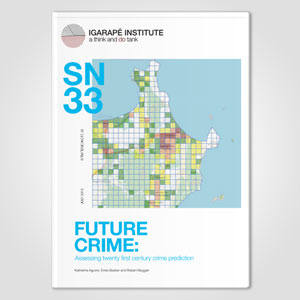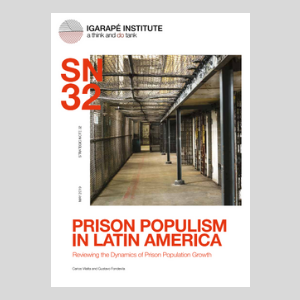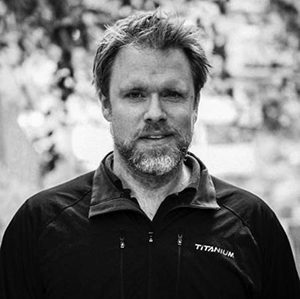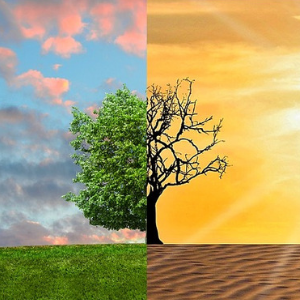
FUTURE CRIME: Assessing twenty first century crime prediction
Cities are where the future happens first.

Cities are where the future happens first.

The absolute number, prevalence and lethality of terrorist incidents has decreased significantly around the world since its peak in 2014.

The 2019 Pritzker Forum on Global Cities takes place in Chicago June 5 through 7.

Robert Muggah talks to the BBC’s Newshour about the recent killings inside the prisons on the Brazilian state of Manaus.

Once again, Brazil’s hellish prisons are making global headlines. The spotlight this week is on Manaus, the capital of the country’s northern Amazonas state, where violence at different prisons left 55 inmates dead.

Brazil recorded 64,000 murders in 2017

Contemporary Africa and the Foreseeable World Order sheds light on the place of “Africa Agency” in the competitive and changing global system

There is growing evidence that climate change can increase the risks of conflict and violence.
By adopting the EPON’s methodology framework, the report has evaluated the effectiveness of the UN peacekeeping efforts in the DRC across eight critical dimensions. A number of significant strategic and operational impacts and three constraints that have undermined UN efforts have also been identified.

Prison Populism finds that Latin America will likely sustain the world´s highest proportion of inmates for the foreseeable future.

The objective of this study is to offer a data-driven review of the growth, trends, and the principle reasons behind the rapid expansion of the prison population in the region during the past two decades.

One of the world’s most homicidal countries just registered the sharpest overall decline of lethal violence in its history

Brazilians have an uneasy but enduring co-existence with homicide. Over 1,060,000 of them have been murdered since 2000.

Gun makers and military industry companies from all over the world gathered in Rio de Janeiro for Latin America’s largest defense and security fair Tuesday, hoping to benefit from Brazil’s new far-right administration and President Jair Bolsonaro’s vow to loosen gun laws.

Robert Muggah, diretor de pesquisa do Igarapé, falou à BBC sobre mudanças climáticas e sua influência na violência.

Apresentação do diretor de pesquisa do Instituto Igarapé, Robert Muggah, no World Governance Forum.

Cities are the defining form of human organization in the 21st century

Brazil has an uneasy co-existence with homicide. At least 1,060,000 Brazilians have been murdered since 2000.

What’s the effect of temperature rising on conflicts at world’s most vulnerable areas?

Last week, two gunmen opened fire at a high school near Sao Paulo, killing eight people, including five schoolchildren

Ilona Szabó de Carvalho is the cofounder and executive director of the Igarapé Institute, a think and do tank based in Brazil and a cofounder of Agora, an initiative to promote and implement more effective public policy.

The world is less violent today than at virtually any other time in human history. Hard as it is to believe, deaths from armed conflicts between states have declined dramatically since the 1950s.

The United States will withdraw all remaining staff from its embassy in Venezuela, according to a late-night March 11 announcement by Secretary of State Mike Pompeo on Twitter, who cited the “deterioriating situation” there.

As the world’s largest terrestrial carbon sink, the Amazon is a key front in the fight against climate change

One of humanity’s gravest existential threats is invisible. Pandemics are silent killers and have prematurely ended the lives of more people than virtually any other cause.

Global cooperation is at a crossroads. Many of the world’s biggest challenges are not a result of disagreements about how to cooperate, but a profound loss of direction about why to cooperate in the first place.

Climate change is already triggering devastating weather events across the planet, including prolonged droughts, flash floods and wildfires.

Brazilian President Jair Bolsonaro tweeted a sexually explicit video of a man touching himself late Tuesday night at a street party during Carnival, a nationwide festival known as the country’s biggest party.

Venezuela’s borders are now dangerous flashpoints in a tense showdown between President Nicolas Maduro and Venezuela’s self-declared interim president, Juan Guaidó.

The crisis in Venezuela risks descending into civil war. The all-out power struggle between President Nicolas Maduro and Juan Guaidó is likely to escalate as Guaidó returned to Venezuela on Monday.

O Instituto Igarapé utiliza cookies e outras tecnologias semelhantes para melhorar a sua experiência, de acordo com a nossa Política de Privacidade e nossos Termos de Uso e, ao continuar navegando, você concorda com essas condições.

